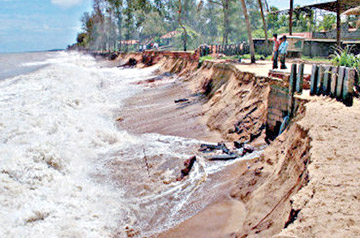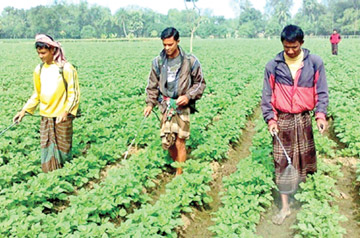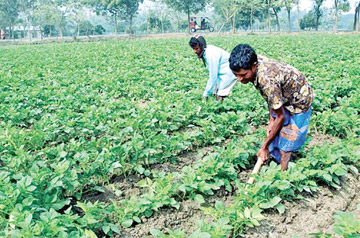Climate change will have adverse impact on Sri Lanka
by Dulmin Samarasinghe
 |
|
Soil erosion on the rise |
Sri Lanka's climate variability has increased. The night temperature
in Nuwara-Eliya has gone up and weather changes in Nuwara Eliya will not
be suitable for potato cultivation and even other types of cultivations.
The Deputy Director of the Centre for Climate Change Studies,
Meteorological Department (CCCSMD) Ms. Anusha Warnasooriya gave a death
knell warning that cultivation in these areas are doomed. This will
create social issues, as farmers have to find alternative means of
living.
The Intergovernmental Panel on Climate Change (IPCC) has issued a
report saying that the effects of climate change are already occurring
in all continents and across the oceans. The report says that the world,
is not prepared for risks from a changing climate and the risks will be
difficult to manage with high levels of global warming. Island states
such as Sri Lanka are vulnerable to climate change as those are
surrounded by sea. The sea level is predicted to rise due to global
warming. Sri Lanka experienced unusual heavy rains and longer period of
droughts last year. This type of weather patterns are expected to
continue in the future.
Ms. Anusha Warnasooriya said that there was a difference between
climate and weather although people believed it to be the same. Climate
is the long time weather that has been prevailing in an area and at
least ten years of change of weather has to be observed to decide
whether the climate has changed. Ideally it should be at least 30 years,
she said. The climate is a complex issue which depends on factors such
as sea, ice, atmosphere and life which includes humans, animals, trees
and buildings.
She said that according to IPCC definition, climate change is the
"variability or average state of the atmosphere over time scales ranging
from decades to millions of years". The temperature of the land and sea
has increased but the heat capacity of the sea is more. This makes the
sea to expand and water level to rise. The heat is felt more in the
Northern hemisphere as there are more lands in the region. The
temperature has increased by 0.6 degrees Centigrade from 1901 to 2005.
But it has increased by 0.74 degrees Centigrade from 1906 to 2005,
indicating a rise in temperature during the recent 100 years.
 |
| Potato
cultivation in Nuwara Eliya, which is at its peak will decline
with climate change |
 |
| Farmers
cultivates potatoes |
Climate change is not only the increase of temperature but decrease
of it as well, she said. The global temperature has decreased in 1940's
where it is attributed to the reduction of industrial activities due to
world wars. Again in 2010 some countries have experienced decline in
temperature while others have seen an increase. Some countries have
experienced more rainfall and others less during the period between 1961
and 1990. She said that more rainfall is expected in Asia in the future.
The rate of sea level rising has increased. It has increased by 1.7mm
per year from 1870 to 2010 and 3.28mm per year from 1993 to 2011. This
could cause problems to island states such as Sri Lanka as coastal areas
could be submerged.Ms. Warnasooriya said that the intensity of cyclones,
hurricanes, typhoons and their effects have become intensified. Extreme
weather conditions have been reported more during 2001 and 2010, she
said. The highest temperature has been recorded in 2010.
Although the climate change occurs due to natural phenomena such as
the change in the path taken by earth to move around the sun from an
oval shape to cycle, change of the side of the angle of earth when
orbiting around sun, a change in earth's 23.5 degrees, a continental
drift, scientists say this could not happen as it takes thousands and
thousands of years. Therefore human activities have contributed to the
climate change, scientists say.
Ms. Warnasooriya said that human activities have altered the
composition of the atmosphere. They have released Carbon-Dioxide to the
atmosphere by burning fossil fuels. Humans have felled trees so that
Carbon-dioxide cannot be absorbed. Emission of green house gasses has
depleted the Ozone layer. Housing and building constructions, cutting
and replacing of trees have changed the landscape and sun rays directly
heat up the earth. The temperature on Mars is -50 degrees Centigrade as
it does not have green house gasses but the temperature on Venus is +470
due to green house gasses there.
"The number of deaths can be increased due to heat waves, people can
get heat strokes, insects, parasites and mosquitoes can be increased,
there can be more rains at the same time there can be more dry areas,
there will be more wild fires and intensity of lightening will be
increased", if the temperature rises, she said. Sea level has risen due
to thermal expansion and melting of ice in the poles. The sea level is
estimated rise by 88cm for 100 years.
Although cyclones are known for their devastating effects, those are
needed to keep the energy balance in the world, she said. Cyclones help
to cool the atmosphere by taking winds across the seas and lands. Sea
currents do a similar task by carrying warm water from equator to poles.
The Intergovernmental Panel on Climate Change is the international
body for assessing the science related to climate change. It was set up
in 1988 by the World Meteorological Organization and the United Nations
Environment Program to provide policy makers with regular assessments of
the scientific basis of climate change, its impacts and future risks,
and options for adaptation and mitigation. Sri Lanka is a member of this
international body.
The report, titled Climate Change 2014: Impacts, Adaptation, and
Vulnerability, from Working Group II of the IPCC, details the impacts of
climate change to date, the future risks from a changing climate, and
the opportunities for effective action to reduce risks. Three hundred
and nine authors and review editors, drawn from 70 countries, were
selected to produce the report. They enlisted the help of 436
contributing authors, and 1,729 experts.
The report has said that responding to climate change involves making
choices about risks in a changing world. The nature of the risks of
climate change is clear, though climate change will continue to produce
surprises. The report identifies vulnerable people, industries, and
ecosystems around the world. It finds that risk from a changing climate
comes from vulnerability and exposure overlapping with hazards.
"We live in an era of man-made climate change," said Vicente Barros,
Co-Chair of Working Group II. "In many cases, we are not prepared for
the climate related risks that we already face. Investments in better
preparation can pay dividends both for the present and for the future."
Adaptation to reduce the risks from a changing climate is now
starting to occur, but with a stronger focus on reacting to past events
than on preparing for a changing future, according to Chris Field,
Co-Chair of Working Group II.
"Climate change adaptation is not an exotic agenda that has never
been tried. Governments, firms, and communities around the world are
building experience with adaptation," Field said. "This experience forms
a starting point for more ambitious adaptations that will be important
as climate and society continue to change", he said.
Future risks from a changing climate depend strongly on the amount of
future climate change. Increasing magnitudes of warming increase the
likelihood of severe and pervasive impacts that may be surprising or
irreversible.
"With high levels of warming that result from continued growth in
greenhouse gas emissions, risks will be challenging to manage, and even
serious, sustained investments in adaptation will face limits," said
Field.
Climate change has already affected agriculture, human health,
ecosystems on land and in the oceans, water supplies, and some people's
livelihoods. The striking feature is that they are occurring from the
tropics to the poles, from small islands to large continents, and from
the wealthiest countries to the poorest.
"The report says that people, societies, and ecosystems are
vulnerable around the world, but with different degree of vulnerability
in different places. Climate change often interacts with other factors
to increase risk," Field said.
Field added: "Understanding climate change and managing risk, opens a
wide range of opportunities for integrating adaptation with economic and
social development. We definitely face challenges, but understanding
those challenges and tackling them creatively can make climate change
adaptation an important way to help build a more vibrant world in the
near term and beyond."
Chair of the IPCC Rajendra Pachauri, said: "The Working Group II
report is another important step forward in understanding how to reduce
and manage the risks of climate change. Along with the reports from
Working Group I and Working Group III, it provides a conceptual map of
not only the essential features of the climate challenge but the options
for solutions."
The Working Group I report was released in September 2013, and the
Working Group III report will be released in April 2014. The IPCC Fifth
Assessment Report cycle concludes with the publication of its Report in
October 2014.
"None of this would be possible without the dedication of the
Co-Chairs of Working Group II and the hundreds of scientists and experts
who volunteered their time to produce this report, as well as the more
than 1,700 expert reviewers worldwide who contributed their invaluable
oversight," Pachauri said. "The IPCC's reports are some of the most
ambitious scientific undertakings in human history, and I am humbled by
and grateful for the contributions of everyone who made them possible."
Working Group II, which assesses impacts, adaptation, and
vulnerability, is co-chaired by Vicente Barros of the University of
Buenos Aires, Argentina, and Chris Field of the Carnegie Institution for
Science, USA.
The Technical Support Unit of Working Group II is hosted by the
Carnegie Institution for Science and funded by the government of the
United States of America
Much of the extreme weather that wreaked havoc in Asia, Europe and
the Pacific region last year can be blamed on human-induced climate
change, according to the World Meteorological Organization.
The U.N. weather agency's annual assessment said 2013 was the sixth
warmest year on record. Thirteen of the 14 warmest years have occurred
in the 21st century.
Rising sea levels has led to increasing damage from storm surges and
coastal flooding, as demonstrated by Typhoon Haiyan, the agency's
Secretary General Michel Jarraud said. The typhoon in November killed
6,100 people and caused $13 billion in damage to the Philippines and
Vietnam. Australia, had its hottest year on record. "Many of the extreme
events of 2013 were consistent with what we would expect as a result of
human-induced climate change," Jarraud said.
He cited other costly weather disasters such as $22 billion damage
from central European flooding in June, $10 billion in damage from
Typhoon Fitow in China and Japan, and a $10 billion drought in much of
China.
Only a few places, including the central United States, were cooler
than normal last year, but 2013 had no El Nino, the warming of the
central Pacific that happens once every few years and changes rain and
temperature patterns around the world. Jarraud spoke as top climate
scientists and representatives from about 100 governments with the
U.N.'s Intergovernmental Panel on Climate Change met in Japan to
complete their latest report on climate change's impact on hunger,
disease, drought, flooding, refugees and war. The risks and overall
effects of climate change are far more immediate and local than
scientists once thought.
It's not just about melting ice, threatened animals and plants. It's
about the human problems of hunger, disease, drought, flooding, refugees
and war, becoming worse.
Severe floods, such as the one that displaced 90,000 people in
Mozambique in 2008, are now more common in Africa and Australia. Europe
and North America are getting more intense downpours that can be
damaging. Melting ice in the Arctic is not only affecting the polar
bears, but already changing the culture and livelihoods of indigenous
people in northern Canada.
Past panel reports have been largely ignored because effects of
climate change seemed too distant in time and location and that
mentality has to be changed, says Pennsylvania State University
scientist Michael Mann.
"Climate change really is a challenge in managing risks," says the
report's chief author, Chris Field of the Carnegie Institution of
Science in California. "It's very clear that we are not prepared for the
kind of events we're seeing."
The panel predicts that warming temperatures will cause existing
international tensions to rise, the first time it is emphasising the
link between warming temperatures and violence as well as increases in
food prices, decreases in the availability of water, increases in health
problems and decreases in economic growth and poverty reduction. |

